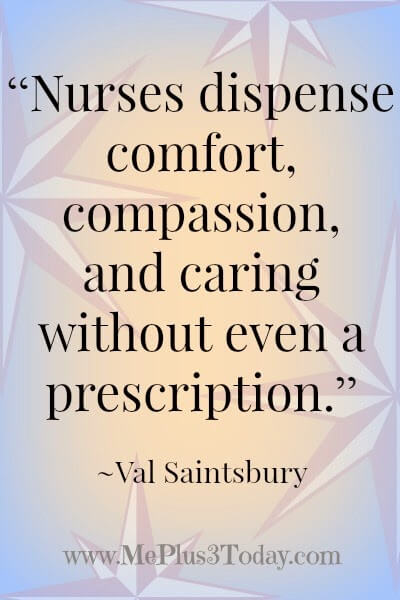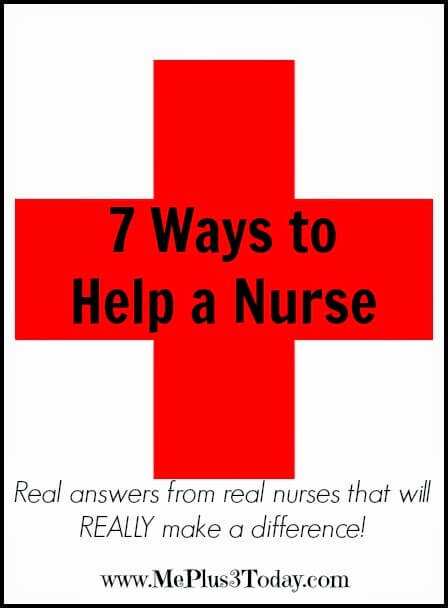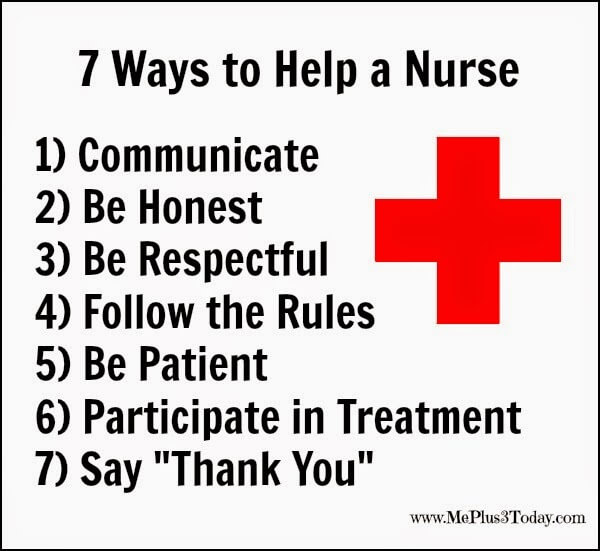Have you been to a doctor’s office or hospital lately? Then chances are you’ve come in contact with a nurse.
1) Communicate
Every single response to my questionnaire had something about communication on it. Patients, their families, and nurses are all on the same team. It’s important to work together to achieve the best possible care for the patient.
So if you don’t understand something, it’s OK to ask. And if you still don’t understand, ask again or ask another nurse. They might explain it in a different way that will make more sense to you.
Bring forth any concerns you might have in a respectful manner. Inform the nurses of needs, expectations and any issues you might have. And if you’re frustrated or upset with something they’ve done, talk with them about it instead of silently being angry. This will help prevent misunderstandings between everyone.
If after trying to open the lines of communication, you and the nurses still aren’t seeing eye to eye, then speak with the Nurse Manager or the Patient Advocate. They are all there to help and ensure that you’re getting the best care.
2) Be Honest
This was another very common response from all the nurses I heard from. Remember, the patient’s health (whether that be you or a friend/family member) is being dealt with. So do not lie. And that includes purposely omitting information because you don’t want to share it. Tell the whole story.
The nurses need to know this information in order to provide the best care. They are there to help, not to judge. So be as accurate and honest as possible when sharing your medical history and information. By being honest in the beginning, it will save time in your overall treatment.
Similarly, you do not need to get defensive when the nurses ask certain questions. They ask everyone these questions, and it’s important that you answer truthfully. If you are with someone that you don’t want to know these answers, or you fear they might hurt you if you tell the truth, try to pull a nurse aside to speak to privately. They will do everything they can to help you and keep you safe.
Also, I just wanted to share an exact quote from one of the nurses: “We’re not going to call the cops because you smoked a joint before you came to the ER.” I’m not completely sure, but I’m pretty sure patient privacy policies give more details on issues like that. If anyone reading this could clarify, I’d appreciate it! (Or maybe I should start actually reading the patient privacy notices that I sign at the doctor’s office!) But I wanted to put that out there, to stress the importance that it’s OK to be honest! With everything!
3) Be Respectful
It bums me out that I even need to include this. Isn’t treating others with respect something that we should all be doing, all the time? But unfortunately, it’s another one that came up often, especially from the few Emergency Room nurses that I heard from. I understand that in the ER emotions are running on high, but do your best to not take that out on the nurses.
It can be difficult for nurses when they only hear complaints or the patients/families have nothing nice to say. So avoid being rude, and instead be polite and respectful when voicing your problems (as mentioned in #1 above). Remember that nurses are people just like you, and they are trying to help you as best they can. So use common courtesy and treat them as you wish to be treated!
Also, respect that nurses have a job to do. When he/she enters the room, quiet down and move out of the way to allow ample space for them to get around.
4) Follow the Rules
As I’m writing this, a little part of me feels like I’m writing the basic principals taught in kindergarten… But again, a lot of “rules” showed up in the responses to how patients and their families could reduce some of the challenges nurses face. Remember, the rules aren’t met to frustrate you, they are for the health and safety of ALL patients, not just you (or the one you are with).
So, follow the set visiting hours. Limit the amount of visitors at each time in order to reduce any rowdiness and congestion in the room that could prevent the nurse from doing his/her job. Keep the volume of your voices low. Do not adjust any equipment. Get permission from a nurse before getting the patient out of bed, bringing food from home, or giving the patient any food.
I’m sure there are many other rules, and more specific rules, depending on each location and situation. So read them and follow them, for everyone’s sake.
5) Be Patient
Pun not intended… 🙂 Remember, there are more patients than nurses. Depending on the situation they may not be able to immediately respond to your request, so you may need to wait. You can help alleviate some of the wait time by informing the nurse of all requests at one time. That way he/she won’t need to spend so much time running back and forth between your room and others.
6) Participate in Treatment
Unfortunately, nurses can’t do everything for you, so it’s important to be involved in your treatment. They appreciate when patients actively participate in their recovery. By communicating (#1), learn what care you are supposed to be receiving. Ask about the medications being given prior to taking them. And report any changes in the patient’s condition immediately. Not only can this help the nurse, it is also a benefit for you to ensure you are receiving the best care possible.
7) Say “Thank You”
Miscellaneous Tips : I really wanted to share these 2 pieces of information but I wasn’t sure which category to put them in. One of the ER nurses wanted to point out that it is important that you (or the patient) not eat anything on the way in to the ER. They may have to run tests that require an empty stomach. However, it is OK to have medicine before heading in. For example, you do not need to leave your child with a 104 degree fever just to prove that it is that high. It is OK to give them something to bring it down.
These are just a few ideas on how to help a nurse. They work hard for the benefit of your health. So the next time you are somewhere with nurses, remember these incredibly simple actions that can help make a nurses job just a little easier.
And that’s just a little bit from Me TODAY!
Do you have a suggestion on a specific type of person or a profession for a “How to Help Series” post? Leave me a comment, or contact me to let me know!






Leave a Reply
8 Comments on "How to Help Series #2: 7 Ways to Help a Nurse"
Great post. I think being open, honest, and gracious are good skills in any communication. These nurses do so much for us (more one on one than the docs) and they do deserve a good thank you.
Thanks Elizabeth. And I agree, there is definitely more 1-on-1 time with the nurses than doctors!
Sarah, <br /><br />It's good to know we can give kids medicine on the way. I didn't know that. And, of course, aside from nurses deserving our appreciation, I'm sure it doesn't hurt the kind of care we receive!<br /><br />Have a great weekend!<br />Brittany
Oh good, I'm glad that was helpful info to share. I didn't know that we could do that either, I was hoping I wasn't the only one out there! Thanks for reading!
Sarah this is fabulous!! I just pinned and shared your graphics.<br /><br />I am always so grateful for what the nurses we have met have done for me and my family. I always want to go back after the fact and give them something to thank them, but the nurses I have talked to said the best thanks are doing the things on your list!<br /><br />Love this post!
Thanks for sharing, I appreciate it! <br /><br />I know, when I had my son, I meant to bring in little goody bags to thank the nurses, but it just completely slipped my mind. I forgot to mention in my article that we were in the hospital over Christmas when the twins were born (on Dec 22), and the nurses were awesome to us despite having to work that day, which makes them deserve even more thanks
Lovely thoughts! So simple, yet they can make so much difference. A lot of them apply to dealings with non-nurses, too!
Great ideas! Nurses truly are the unsung heroes!